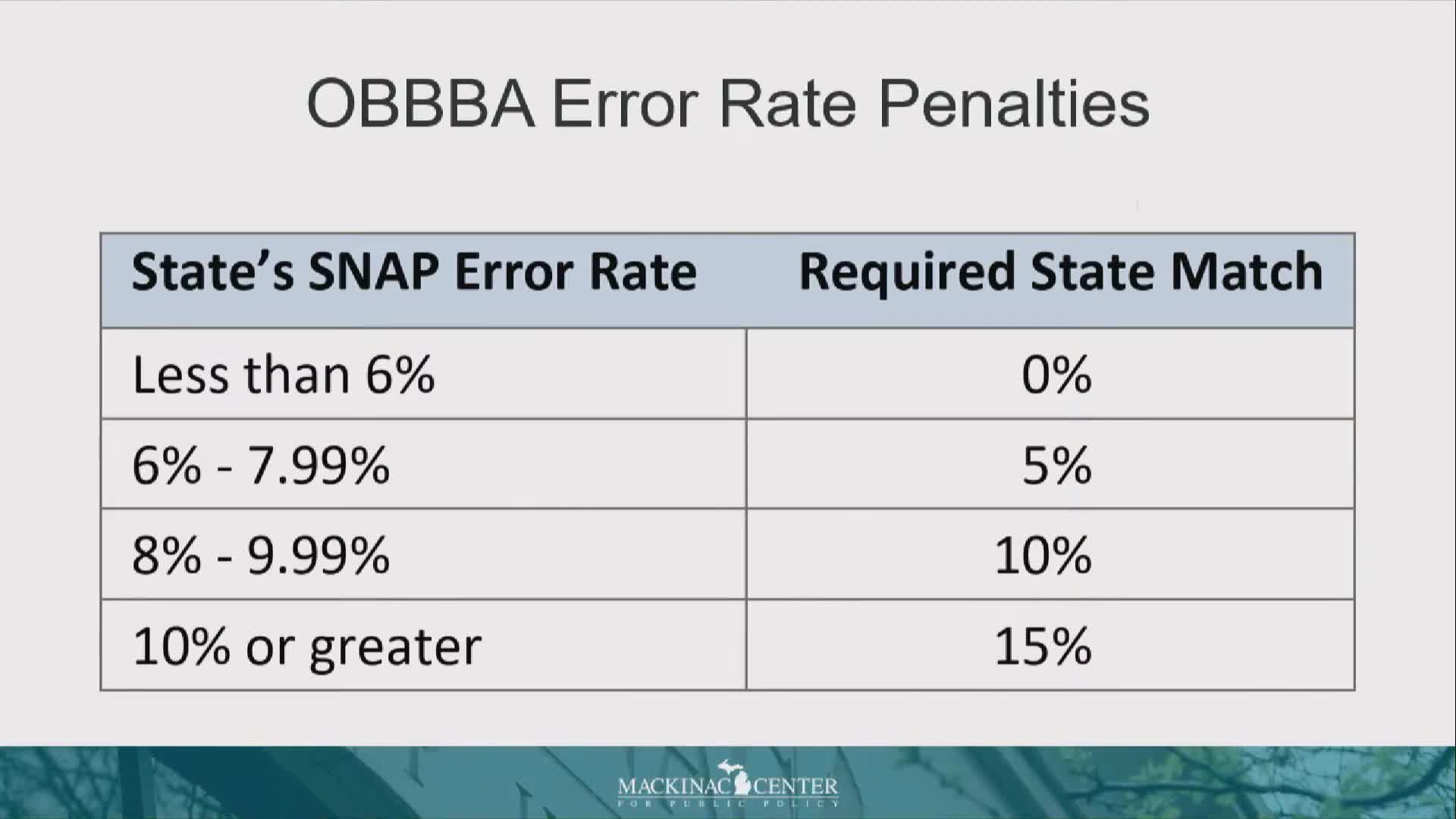Michigan Faces Up to $575M in SNAP Administrative Costs Amid High Error Rates
September 19, 2025 | 2025 House Legislature MI, Michigan
This article was created by AI summarizing key points discussed. AI makes mistakes, so for full details and context, please refer to the video of the full meeting. Please report any errors so we can fix them. Report an error »

In a recent meeting of the Oversight Subcommittee on State and Local Public Assistance Programs, critical discussions unfolded regarding the integrity and financial implications of Michigan's Supplemental Nutrition Assistance Program (SNAP). As the committee convened, the atmosphere was charged with the urgency of addressing significant error rates in the program, which could have far-reaching consequences for the state's budget.
The committee revealed alarming statistics: approximately 38% of SNAP dollars were found to be paid in error. This figure raises concerns about the overall efficiency of the program, especially as the state grapples with potential financial penalties tied to these errors. If the error rate remains between 6% and 8%, Michigan could face a cost of $160 million. Should the rate rise to between 8% and 10%, that figure could double to $320 million. In the worst-case scenario, with an error rate exceeding 10%, the state might incur a staggering $480 million in penalties.
The implications of these figures are profound. With an estimated total budget of $3.2 billion for fiscal year 2024, the state is bracing for an additional $95 million in administrative costs due to a shift in federal funding policies. This adjustment could push the total financial exposure for Michigan to between $95 million and $575 million, a significant burden for state resources.
Earlier discussions in the media had suggested that Michigan might be liable for as much as $900 million in additional SNAP payments, a figure that stemmed from an earlier version of federal legislation proposing a 25% penalty. Fortunately, this penalty was not included in the final bill, providing some relief to state officials.
The committee also delved into the root causes of these error rates, identifying issues such as SNAP benefit tracking, electronic benefit transfer card fraud, and technical glitches that can disrupt the distribution process. Retailer application fraud and errors in the quality control processes by state agencies were also highlighted as contributing factors.
As the meeting concluded, the urgency of addressing these challenges was clear. The financial stakes are high, and the need for effective oversight and reform in Michigan's SNAP program has never been more pressing. The committee's discussions set the stage for future actions aimed at safeguarding the integrity of public assistance programs and ensuring that vital resources reach those in need.
The committee revealed alarming statistics: approximately 38% of SNAP dollars were found to be paid in error. This figure raises concerns about the overall efficiency of the program, especially as the state grapples with potential financial penalties tied to these errors. If the error rate remains between 6% and 8%, Michigan could face a cost of $160 million. Should the rate rise to between 8% and 10%, that figure could double to $320 million. In the worst-case scenario, with an error rate exceeding 10%, the state might incur a staggering $480 million in penalties.
The implications of these figures are profound. With an estimated total budget of $3.2 billion for fiscal year 2024, the state is bracing for an additional $95 million in administrative costs due to a shift in federal funding policies. This adjustment could push the total financial exposure for Michigan to between $95 million and $575 million, a significant burden for state resources.
Earlier discussions in the media had suggested that Michigan might be liable for as much as $900 million in additional SNAP payments, a figure that stemmed from an earlier version of federal legislation proposing a 25% penalty. Fortunately, this penalty was not included in the final bill, providing some relief to state officials.
The committee also delved into the root causes of these error rates, identifying issues such as SNAP benefit tracking, electronic benefit transfer card fraud, and technical glitches that can disrupt the distribution process. Retailer application fraud and errors in the quality control processes by state agencies were also highlighted as contributing factors.
As the meeting concluded, the urgency of addressing these challenges was clear. The financial stakes are high, and the need for effective oversight and reform in Michigan's SNAP program has never been more pressing. The committee's discussions set the stage for future actions aimed at safeguarding the integrity of public assistance programs and ensuring that vital resources reach those in need.
View full meeting
This article is based on a recent meeting—watch the full video and explore the complete transcript for deeper insights into the discussion.
View full meeting
